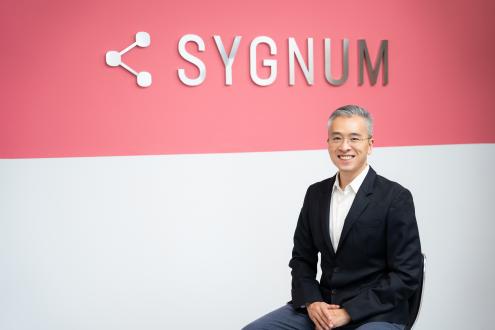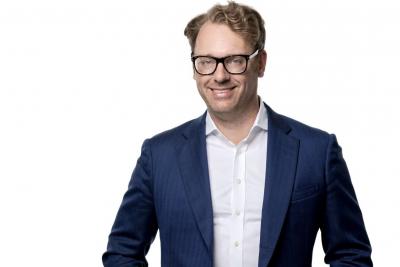Sygnum Singapore CEO Gerald Goh Articulates his Vision of an Institutionalised Future for Digital Assets

Gerald Goh of Sygnum
Sep 15, 2022
In January this year, Sygnum, a digital asset technology group with a Swiss banking license and a Singapore Capital Markets Services licence, announced it had raised USD90 million in an oversubscribed Series B funding round led by Hong Kong investment company Sun Hung Kai & Co. That came on top of over USD10 million of new money arriving in 2021 from a number of investors in a funding round led by Japan’s SBI Group. Hubbis was fortunate to recently reconnect with Gerald Goh, CEO of Sygnum Singapore and co-founder of the enterprise alongside three Swiss partners – all of whom still hold key roles in the group. He updated us on his vision of the world of digital assets that lies ahead, how the institutionalisation of the digital assets market will dramatically expand the financial universe, and how, as this happens, Sygnum is positioning itself to be a market leader and a major force for innovation. He casts his horizon beyond the near-term volatility and negativity around cryptocurrencies, explaining that the long-term potential and use cases of digital assets continues to expand apace, democratising access to numerous assets that otherwise would be beyond reach to private investors. The fallout from the global sell-off across all asset classes is, he reports, resulting in investors in the world of digital assets embarking on a flight to quality, regulated intermediaries such as Sygnum that deliver institutional grade services, governance, and capabilities.
Founded on Swiss and Singapore heritage, Sygnum describes itself as the world’s first digital asset bank and a digital asset specialist with a global reach. Sygnum operates through its two regulated entities in the financial hubs of Switzerland and Singapore – under Sygnum Bank AG’s Swiss banking licence, granted by the regulator in late 2019, as well as Sygnum Pte Ltd’s capital markets services (CMS) licence in Singapore.
Delivering trustworthiness
Sygnum aims to empower institutional and private qualified investors, corporates, banks, and other financial institutions to invest in the digital asset economy with complete trust. The firm’s Swiss operations focuses on the provision of an independently controlled, scalable and future-proof regulated banking platform while in Singapore, it operates as a specialised digital asset fund manager, securities dealer, and corporate finance advisor.
As a group, Sygnum consists of an interdisciplinary team of banking, investment, Blockchain, regulatory and compliance experts shaping the development of a trusted digital asset ecosystem. Sygnum’s six core operations include brokerage, accounts & custody, tokenisation, asset management, credit & lending, and B2B banking services.
Leading the way by example
Gerald Goh is one of Sygnum’s Co-Founders & its Singapore CEO, a role he took on in October 2020, before which he was the firm’s Chief Strategy Officer. Previously, he was the Head of Alternative Investments for CrimsoNox Capital, a single-family office, where he successfully built up its exposure in alternate investments.
Before that he was a Managing Director with global investment advisor Cambridge Associates, where he focused on private investments and worked with numerous sovereign wealth funds, endowments and foundations, pension funds, and single-family offices to build and monitor their global private investment programmes.
Major funding based on real growth
He reports that the USD90 million Series B funding came at an opportune time. Fuelled by continued strong demand for its integrated portfolio of regulated digital asset products and services, Sygnum in 2021 had delivered a tenfold year-on-year increase in consolidated gross revenues. In the same period, its client base neared 1,000 financial institutions, banks, corporates and private investors, and its assets under administration grew to well over USD2 billion.
Gerald also notes that, as with all prior fundraising rounds, the Series B also saw the participation of a large group of employees as investors. The co-founders, board members, management and other employees continues to hold majority ownership of the company.
Turbocharging expansion
The proceeds, he reports, are now helping accelerate Sygnum’s development of new institutional-grade Web 3.0 offerings. These include additional yield-generating products, including white-listed DeFi pools and expanded staking services, asset management solutions providing trusted access to new, high-growth DeFi innovations, and new commercial partnerships with leading blockchain ecosystems like the Dfinity Foundation and Klatyn Foundation.
“The USD 90m we raised will also propel Sygnum’s market-tested offerings into new global markets, expand our Singapore operations, and provide opportunities to co-create and distribute innovative products internationally with its strategic investors,” he explains.
“Savvy digital asset investors are increasingly looking for novel opportunities in the frontiers of Web 3.0, including DeFi yield-generation, NFTs and the metaverse. We look forward to partnering with our strong global network of strategic investors to expand our suite of fully regulated digital asset offerings and solutions into these emerging verticals.”
Mathias Imbach, Sygnum’s Co-Founder and Group CEO, said at the time of the January announcement: “The digital asset economy is rapidly crossing the chasm to mainstream adoption, where investors will demand fully regulated solutions as they accelerate their exposure. This financing round is a key milestone in our global expansion and in our mission to empower everyone everywhere to own digital assets with complete trust.”
Forging ahead through stormy seas
Gerald is under no illusions that conditions have changed.
“We built robustly through the bull market, but even now, as we are in more wintery, bear market conditions, we've continued to expand our business case,” he reports. “We are licensed and regulated as a universal bank and securities dealer in Switzerland, and we have increased our number of banking clients by well over 30% year-to-date to over 1200 currently.”
And those clients include leading institutional investors, corporates, financial institutions, and very wealthy private clients. “Hence, despite the market downturn, in Q2 this year, Sygnum registered our strongest quarter for operating revenues ever. This was driven both by increased volatility and higher trading activity, and a general flight to trusted counterparties which resulted in net new money inflows into the bank,” he explains.
The flight to quality
He says that the meltdown in the cryptocurrencies market had not negatively impacted Sygnum’s financial health. “We have avoided exposure to troubled counterparties, and we see the shakeout as leading to a bifurcation in this industry.”
On the other hand, he explains that when choosing which centralised institution, or exchange to work with in the digital asset space, there has been a clear flight to quality. “The significant gaps in corporate governance amongst some entities have grown wider and more obvious,” he reports. “Market corrections often expose shortcomings in risk management policies.”
The result, he says, is an exodus towards regulated platforms, and a parallel increased drive to greater regulatory oversight across the globe. Lending exposures in the digital assets universe are of particular concern, and in this regard, he states that Sygnum, as a fully regulated bank and securities dealer in Switzerland, has weathered the storm because of its corporate governance practices and astute risk management.
Firing on all cylinders
“Sygnum has continued to progress its business, its client base, we continue to deliver strong revenues through up and down markets, and we are in good financial health with a strong balance sheet,” he reports. And he adds that the recent market turmoil underscores the need for tightly regulated and centralised financial institutions like Sygnum as a safe access point for investors who are seeking to participate in the crypto and digital assets universe.
Gerald points out that Sygnum is also licensed in Singapore, where it initially operated under the CMS - Capital Markets Services – license for fund management, and more recently has obtained three additional approvals from the Monetary Authority to provide corporate finance advisory, to deal in capital market products, and also provide custodial services.
Expanding the regulatory advantages
“We have a much broader regulatory footprint in Singapore today as compared to last year, and have applied to be a Major Payment Institution licensed under the Payment Services Act. If approved, this will also allow us to provide brokerage and custody for crypto assets,” he explains.
In Switzerland, he reports, the bank’s offering is essentially full spectrum. He says the easiest way is to explain that Sygnum has two core business lines: transaction banking and wealth management.
Transactional banking
The first of these, he explains, is effectively commercial banking, such as providing custodial banking, payments, lending, and safekeeping of both digital and fiat-currency assets. “In this sector, the bank’s primary client profiles are corporates, established companies and start-ups who are seeking to build or manage their crypto exposures, and to leverage trusted rails to seamlessly convert between crypto and fiat to meet day-to-day operational requirements,” he says.
Wealth management
The other key business segment is wealth, centred on asset management products and discretionary mandates, both of which the firm offers out of the bank in Switzerland and in Singapore under its CMS license. “We provide institutional investors, HNWIs, and UHNWIs with the means to build exposure to crypto and digital assets either through directly holdings coins and tokens within our banking platform, or investing into digital asset strategies via passive and active funds. We also offer fully discretionary mandates to act essentially as an outsourced CIO to individuals and family offices for crypto and digital assets.”
He zooms in further on the wealth management offering, noting that private bankers and other wealth managers seeking to curate a more active focus on cryptos and digital assets amongst their clients should first raise their understanding of the rapidly-evolving space.
The glass is more than half full
“Despite the sell-off in cryptos in particular, the momentum for digital assets remains positive,” he says.
“Like it or not, I think private wealth managers, traditional managers can only keep their heads in the sand for so long. We believe the crypto market will survive this downturn as it has in previous bear markets, and client activity will continue to grow.”
“And from our perspective, we have continued to add clients even in May and June, and there is also a shift from mainly private wealth clients to institutions, especially family offices, but also increasingly pension funds, foundations, and others. Moreover, the pipeline for new clients remains extremely robust.”
Nevertheless, he does concede that the sell-off has elevated the fear factor across all asset classes, digital and mainstream. “The reality is this is likely to impact negatively the capital allocated to crypto assets in the near-term,” he admits, “but longer-term the trend for us remains very clear, and that big picture evolution continues to be reaffirmed with ongoing market developments, client surveys and market feedback.”
Building trust
Aside from helping to raise the level of understanding regarding the asset class, Gerald explains that the platforms and service providers need to engender more trust amongst current and future participants. “There is immense complexity around digital assets and their different uses and applications,” he reports. “There are significant technology risks, and growing regulatory scrutiny, without consensus yet across different jurisdictions. It is complexity piled on top of complexity, so it is understandable that traditional wealth industry participants are confused or shun this world entirely.”
To overcome this fear and reluctance, Gerald maintains that the wealth market needs to turn to trusted parties and to obtain trusted advice.
The cream rises to the top
“The good news,” he says, “is that in recent years – and Sygnum was founded only four years ago in different conditions – it has become far easier to identify and work with regulated financial institutions, certainly in leading markets such as Singapore or Switzerland. And that in turn means clients now have more channels to easily build robust, and diversified crypto exposures with complete peace of mind.”
Gerald adds that ultimately, traditional wealth managers and crypto financial institutions like Sygnum are all seeking to help clients address the same pain points and achieve the same portfolio optimisation.
The one-stop platform built on firm foundations
“Moreover, as a one-stop platform for transaction and custody of crypto assets, investors can be very comfortable in dealing with a regulated bank such as Sygnum,” he states. “Perhaps the most appealing value proposition that we bring to the industry right now is our ability to make things as simple and trusted as possible – investors’ complexity should be focused on evaluating their investment and digital asset use cases, not on operational risk or getting exposed to reputational risks.”
Gerald closes his commentary by highlighting the investor shift since perhaps 2020 from risk-taking early adopters holding tokens directly, to more conventional capital allocators expressing their participation more through curated fund strategies, with core-satellite type approaches as with mainstream portfolios allocation practices.
An evolving market
“The result is a new channel for traditional asset managers and wealth managers to deepen their participation into the digital asset ecosystem, because they can bypass the expectation from clients to offer direct cryptos or token selection, and to focus instead on fund-centric portfolio construction for their digital asset allocations,” he reports. This means, essentially, that the world of traditional asset and wealth management and the digital assets universe can thereby work more harmoniously than ever before.
Key Priorities
These comments lead Gerald to offer up his key priorities for Sygnum. First, he wants to develop new products and services to better meet the evolving crypto market and the increasing institutionalisation of the sector. “These new types of more institutional investors need far more customised and sophisticated offerings,” he states.
Secondly, at the same time Sygnum wants to double down on its educational drive, with more communication and thought leadership around the industry. “We see it as our responsibility as a digital asset specialist to provide actionable insights to help intermediaries and wealth managers, and of course the end-clients, to make informed decisions on the opportunities as well as the risks.”
A third mission is to expand the variety of offerings, for example branching out into capital market activities, having obtained its corporate finance advisory and dealing license in Singapore. “We have also launched what we call a strategic digital assets solutions business, delivering what will be a hybrid securities and token capital raising solution for issuers,” he reports. “More will become clear soon, but we are now mandated by one of the largest companies in Asia that is launching a new Metaverse subsidiary, and they have mandated us to help them raise a nine-digit sum over the next two years in a mix of both traditional securities as well as tokens, and as a means of engaging a different community of stakeholders.”
And fourthly, there is the drive to plant new Sygnum flags in new markets in the Middle East and Europe, where the firm has applied for new licenses. “We are aiming to keep expanding the ecosystem,” he reports.
A bright future
Gerald closes the conversation by reiterating that the time is ripe for the next generation of wealth managers and investors to really get involved and embrace the disruptive power of digital assets.
“Whatever the near-term volatility and concerns, we are convinced that the global traditional financial infrastructure will see continuing innovation as the advent of the blockchain technology opens the doors ever wider to a wider array of digitised assets,” he states. “Sygnum is working hard to bring regulated products and services to what is an increasingly sophisticated investor base. The future of our industry is bright.”
Getting Personal with Gerald Goh
Gerald Goh is Co-Founder & CEO of Sygnum Singapore, a role he took on in October 2020, before which he was its Chief Strategy Officer. Previously, he was the Head of Alternative Investments for CrimsoNox Capital, a single-family office, where he successfully built up its exposure in alternate investments.
Before that he was a Managing Director with global investment advisor Cambridge Associates, where he focused on private investments and worked with numerous sovereign wealth funds, endowments and foundations, pension funds, and single-family offices to build and monitor their global private investment programs.
Born and educated in Singapore, he holds a bachelor’s degree in Management, summa cum laude, from the Singapore Management University.
His 11 years at leading institutional investment advisory firm Cambridge Associates stood him in excellent stead for the co-founder and now CEO role he holds at Sygnum today. “Cambridge actually serves, for example, 60% or more of the US endowment and foundation market, and in my time spent there, my clients included the largest sovereign wealth funds, pension funds, and university endowments in Asia, and the largest single-family offices out here as well. Then my two years with the single-family office led me naturally into the world of digital assets, where I saw a great deal of work was required, but also where great opportunity awaited.”
Since we last met, Gerald says his cookery skills and repertoire have both increased during the pandemic and lockdowns, for example with Singapore Laksa and a Hokkien prawn noodles dish added to the domestic menu.
Another lockdown-inspired hobby has been HIIT workouts from home, which he learnt from watching instructional YouTube videos.
He also enjoys visiting the team in Sygnum’s Switzerland HQ. He recently managed to fly to Stellenbosch in South Africa to attend the destination wedding of one of the Sygnum co-founders.

Co-Founder & CEO at Sygnum

More from Gerald Goh, Sygnum
Latest Articles






